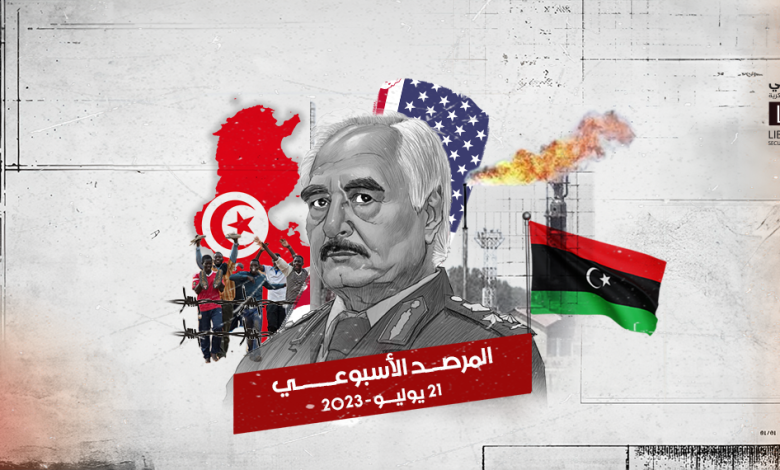The Weekly Observatory July 21 – 2023

Preface
In this paper , we seek to shed light on a summary of the most important political events taking place during the week , in which we aim at an analytical reading of some positions , and an attempt to understand their context and present them to those interested , to contribute to raising awareness about the events and their developments.
-
A new lawsuit against Haftar in Washington
The Libyan-American coalition announced that it had filed a lawsuit against the head of Wagner’s mercenaries, “Yevgeny Prigozhin” and “Khalifa Haftar” on charges of committing war crimes against civilians in Libya. According to the coalition president, The lawsuit is based on accusing Haftar and Prigozhin of torturing a Libyan citizen and killing a member of his family, This is in accordance with their actual or apparent authority over their forces and hold them fully liable for damages under the Torture Victims Protection Act.
This case is not the first of its kind against Haftar and his allies. Where the aforementioned faced about 5 previous cases related to “war crimes” in Tripoli and Benghazi previously, without broadcasting it by the American judiciary, In light of the exclusion of any possibilities of condemning Haftar.
-
The return of production in the “El Feel” and “Sharara “ fields
Days after they were closed due to the tribal objection to the arrest of the former Minister of Finance in the Government of National Accord, Faraj Boumtari, Production returns to the “El Feel” and “Sharara” fields, after losing about 350,000 barrels as a result of the closure.
And after the closure was immediately lifted, the release of “Boumtari” was announced. With formal charges being filed against him for involvement in corruption cases, According to the Internal Security Service – Tripoli.
Where he announced in a statement that the detention of “Boumtari” came based on the receipt of information indicating his involvement in incidents and suspicions of financial corruption. The agency stated in its statement that Boumtari established a private company while assuming his ministerial duties. He entered into contracts punctuated by suspicions of corruption. The agency added that Boumtari also covered up an incident of financial corruption that cost the state tens of millions of foreign currency losses. Referring to his referral to the Office of the Attorney General for investigation.
This comes as a comment on the release of Boumtari and his handover to his family by the Public Prosecutor’s Office. days after his detention in Tripoli, In conjunction with that, The Minister of Oil in the Government of National Unity, “Mohammed Aoun,” confirmed to Al-Ahrar the issuance of instructions to start operating the El-Feel and El-Sharara fields.
The UN Support Mission in Libya welcomed the release of former Finance Minister Faraj Boumtari a few days later. The UN mission renewed its call for the release of all arbitrarily detained civilians, activists, political figures and members of the security services.
this, A group from the Zwayya tribe, from which Boumtari descended, closed the El-Feel field. Before another Ubari group shut down the El Sharara field, In solidarity with the Boumtari incident and the Al-Zawiya tribe, according to a statement issued by them.
This closure, which came as a surprise, especially with the Western need for Libyan oil barrels at this particular time, has negative effects on several aspects. economy, and electricity. The Sharara field alone produces about 240,000 barrels. The El Feel field produces about 80,000 barrels. As a result, the General Electricity Company announced that it was not responsible for the possible effects on the work of the network in all parts of the country. While the Minister of Oil in the unity government, “Mohammed Aoun,” issued a warning as a result of this closure. Pointing out that the first affected by this measure is the Libyan people.
In a similar context, the parliament-designated government headed by “Osama Hammad” had earlier hinted at the oil shutdown in protest against the unfair distribution of wealth – according to what she said – which sparked a wave of local and international interactions – we referred to it in the previous weekly paper – which eventually ended with the formation of the “Presidential Council” a supreme financial committee to monitor the government’s public spending in Tripoli and began its first meeting in the city of Sirte last week.
-
Accusations of Tunisia expelling migrants to Libya
The Libyan Ministry of Interior broadcast video clips documenting the tragic conditions of expatriates and immigrants. , She said they were expelled by the Tunisian authorities towards Libya, In the desert border areas between the two countries.
The Ministry of Interior of the Government of National Accord conducted interviews with some of the expatriates. Where they expressed the burning of their official papers by the Tunisian authorities, in addition to forcing them to go to Libya, Human Rights Watch was She said on July 7 that the Tunisian security forces expelled hundreds of migrants and asylum seekers of different African nationalities to a dangerous area on the Tunisian-Libyan border, The organization stated, citing testimonies of immigrants, The National Guard and the Tunisian army transferred the expelled to an isolated area on the Libyan border. They cannot cross it to enter Libya or return from it to Tunisia.
Human Rights Watch stated that among the expelled migrants were children and pregnant women. Among them is a group that entered Tunisia with regular status and regular procedures.
The organization accused the Tunisian authorities of not following due process and that, Many immigrants have been subjected to violence by the authorities during detention or expulsion. The researcher on the rights of refugees and immigrants in the organization, “Lauren Seibert,” explained, The Tunisian government should stop mass expulsions and allow immediate humanitarian access to African migrants and asylum-seekers.
The organization estimated the number of migrants who were expelled to the border area with Libya, the Tunisian city of “Ben Guerdane”, which is approximately 35 km from the Libyan border. between 500 and 700 immigrants, The organization added that at least 6 of the expelled asylum seekers are registered with the United Nations High Commissioner for Refugees. And at least two other people who have consular cards as students in Tunisia, In the context of the testimonies published by the organization, the migrants spoke of the Tunisian security forces destroying the phones of all the migrants before expelling them. Noting that they were contacted and their location was sent via a hidden phone.
To download the file, click here
This content is also available in:
العربية
Français
Türkçe
Italiano

